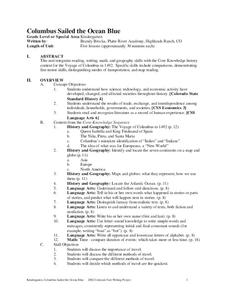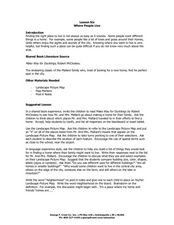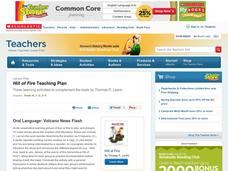Curated OER
OLYMPIC SHADOW BOXES
Students, in groups, use library reference materials to research an Olympic sport and create a visual display/shadow box to represent it.
Captain Planet Foundation
George Washington Carver and the Sweet Potato
Learn about George Washington Carver's important contributions to agriculture by studying the sweet potato. First graders read about the inventor's observations and prepare sweet potato slips for the class garden. Additionally, they...
Curated OER
Heeding Advice
Compare and contrast various foreign perspectives on the George W. Bush administration's plans for military action. Middle schoolers read the article "Blair and Chirac Head to U.S. to Talks and a Show of Unity." Then, they analyze...
Curated OER
Citizens of the Future
Young sociologists explore how local, state, and federal governments work. This very impressive and ambitious lesson requires pupils to contact government officials who represent them and their families. They research elections, and hold...
Curated OER
Spanish Reflexive Verbs
Why is it that in English you shave, and in Spanish you shave yourself? Spanish uses reflexive verbs. Your pupils can master reflexive verbs with the explanation provided here. Conjugation of this type of verb is described with...
BioEd Online
Gravity and Buoyancy
Would a baggie filled with water have the same shape sitting on a table as it would in a bucket of water? Why not? Allow learners to find out first-hand the effects of gravity acting alone on the baggie, as well as when gravity is...
Core Knowledge Foundation
Columbus Sailed the Ocean Blue
Young adventurers embark on a journey, setting sail along the blue ocean with Christopher Columbus. Teachers will find that this unit makes their lesson planning smooth sailing!
Curated OER
Forces of Change
Second graders discuss various ways in which landforms change over time. They, in groups, research and create a reference book about landform change including tsunamis, earthquakes, weathering, erosion and volcanic eruptions.
Curated OER
Art One-Master Emulation Acrylic Painting Lesson Plan
Young scholars examine art history books and gather information on three masters. Using the text, they gather information about their history, style, and the techniques they used. They create their own paintings using acrylic paint using...
Curated OER
Perceptions - Frame of Reference
Students understand that a person's perception or judgement of something or someone is greatly influenced by one's frame of reference including one's values, beliefs, experience and country.
Curated OER
The Middle East- Geography
Students discover the geography of the Middle East. In this geography lesson, students use reference books and the Internet to research the geography of the Middle East. Students complete an activity sheet to match the capital cities...
Curated OER
Introduce Vocabulary: A Picture Book of Abe Lincoln
Young scholars examine SA Picture Book of Abe Lincoln. In this language arts lesson, students listen to the story and discuss the meaning of the story vocabulary.
Curated OER
A Picture Book of Helen
Students learn the meaning of tier two vocabulary words. In this vocabulary lesson plan, students read A Picture Book of Helen Keller, listening for 3 pre-selected, tier two vocabulary words. Words are defined by the teacher and students...
Curated OER
Lesson Six Where People Live
Students investigate where people live. In this early geography lesson, students read Make Way for Ducklings! by Robert McCloskey and then discuss what neighborhoods are as they identify them on landscape picture maps.
Curated OER
Lesson Plan for St. Catherine
Students analyze the art of St. Catherine and Gothic Art. In this art analysis lesson, students read the biography of St. Catherine and read about the carving of the statue. Students complete a related statue art activity and carve their...
Curated OER
My Secret War: Lesson 12
Fifth graders explore how the war affected American children. In this social studies lesson, 5th graders discuss how quotes made people feel about the war effort. Students write reflections on their reading.
Curated OER
Places in our School Yard - An "I Spy" Book
Students create a class big book using the "I Spy" game format and adding 3 clues to help readers guess the areas of a naturalization project.
Curated OER
Become a Character: Adjectives, Character Traits, and Perspective
High schoolers use an online chart to match the character traits of a character in a book they are reading with specific actions the character takes. Students then work in pairs to "become" one of the major characters in a book and...
Curated OER
Jack and The Beanstalk Estimation
Introduce the day's lesson by reading Jack and The Beanstalk by Richard Walker, and then review the concept of area with your class. We don't always need rulers to measure, though! Teach learners how to use their hands to help us measure...
Museum of Disability
Rolling Along
Kindness and empathy can be as important as reading comprehension skills, especially for younger learners. Reinforce both with a lesson based on Rolling Along: The Story of Taylor and His Wheelchair by Jamee Riggio Heelan. As...
Curated OER
Water 1: Water and Ice
Students explore the states of water. In this science lesson, students use observation, measurement, and communication skills to describe water as it changes from a solid to a liquid.
Curated OER
Erupting Volcanoes!
Young scholars examine the causes of earthquakes, volcanoes, and floods, and explore how these events shape the surface of the earth. In this erupting volcanoes lesson, students create a volcano model of their own, make observations...
Scholastic
Hill of Fire Teaching Plan
Some books are perfect for drawing connections between multiple subjects. The book Hill of Fire becomes the hub for three very different, yet related activity ideas. First the class hones their oral language skills by creating an...
Curated OER
How to Use Expanded Form
Third graders write numbers in expanded form. In this math vocabulary lesson, 3rd graders write numbers in expanded form using words only, words and numbers, and numbers only. Each student is given three dice to roll. They then write the...

























